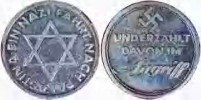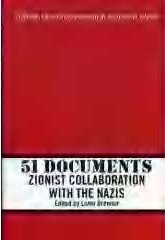If, without further facts, anyone were told that the early Zionists were racists, it would be automatic to assume this to be a part of the colonialist aspects of Zionism in Palestine. In reality this is not so; Blut Zionism would have evolved even if Palestine were to have been completely empty. Enthusiasm for Blut und Boden were part of Zionism before the first modern Zionist ever left Europe.
Race Zionism was a curious offshoot of racial anti-Semitism. True, these Zionists argued, the Jews were a pure race, certainly purer than, say, the Germans who, as even the pan-Germanics conceded, had a huge admixture of Slavic blood. But to these Zionists, even their racial purity could not overcome the one flaw in Jewish existence: they did not have their own Jewish Boden. If the Teutonic racists could see themselves as Übermenschen (supermen), these Hebrew racists did not see the Jews in that light; rather, it was the reverse. They believed that because they lacked their own Boden the Jews were Untermenschen and therefore, for their “hosts”, little more than leeches: the world pest.
If one believes in the validity of racial exclusiveness, it is difficult to object to anyone else’s racism. If one believes further that it is impossible for any people to be healthy except in their own homeland, then one cannot object to anyone else excluding “aliens” from their territory. In fact the average Zionist never thought of himself as leaving civilised Europe for the wilds of Palestine. In life it is obvious that Zionist Blut und Boden provided an excellent rationale for not fighting anti-Semitism on its home ground. It was not the fault of the anti-Semites, it was because of the Jews’ own misfortune of being in exile. The Zionists could tearfully argue that the loss of Palestine was the root cause of anti-Semitism and the regaining of Palestine was the only solution to the Jewish question. Everything else could only be palliative or futile.
Walter Laqueur, the doyen of Zionist historians, has asked in his book, A History of Zionism, if Zionist insistence on the naturalness of anti-Semitism was not just “grist to the mill of Nazi propaganda”. [i] It certainly was. Laqueur’s question can best be answered with another question: is it difficult to understand the gullible reader of a Nazi newspaper, who concluded that what was said by the Nazis, and agreed to by the Zionists – Jews – had to be right?
There would be worse: any Jewish movement that prattled on about the naturalness of anti-Semitism would, just as “naturally”, seek to come to terms with the Nazis when they came to power.
----------
[i] Walter Laqueur, A History of Zionism, p.500.
Tuesday, September 25, 2007
Subscribe to:
Post Comments (Atom)



No comments:
Post a Comment